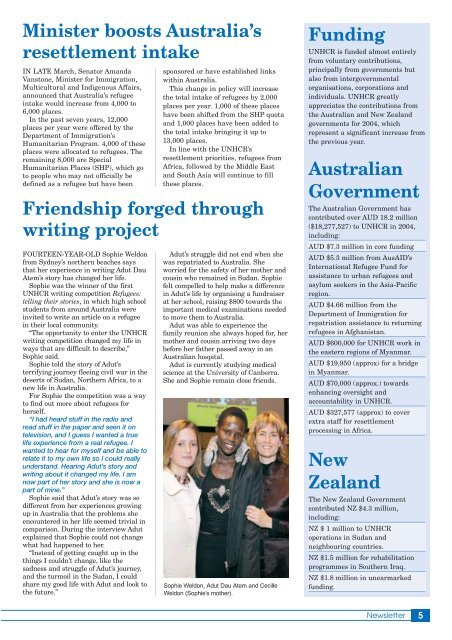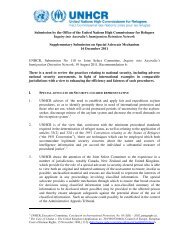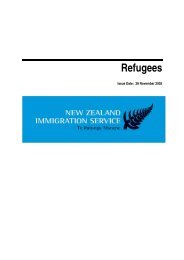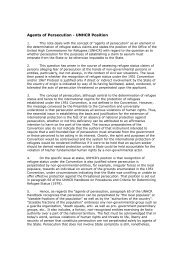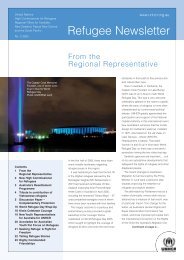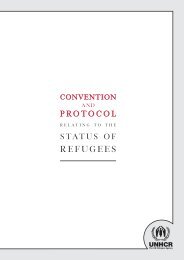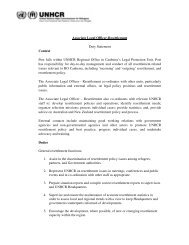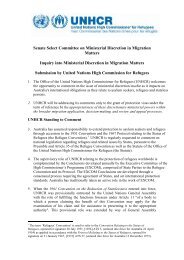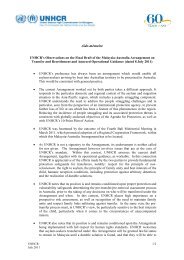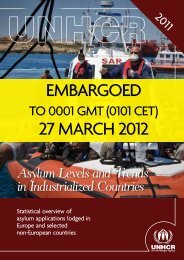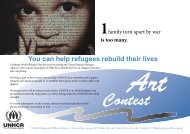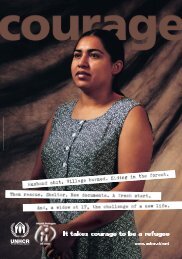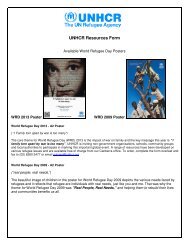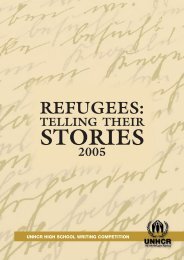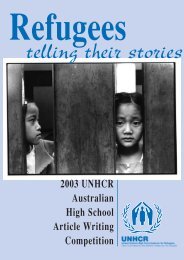download newsletter - unhcr
download newsletter - unhcr
download newsletter - unhcr
You also want an ePaper? Increase the reach of your titles
YUMPU automatically turns print PDFs into web optimized ePapers that Google loves.
Minister boosts Australia’s<br />
resettlement intake<br />
IN LATE March, Senator Amanda<br />
Vanstone, Minister for Immigration,<br />
Multicultural and Indigenous Affairs,<br />
announced that Australia’s refugee<br />
intake would increase from 4,000 to<br />
6,000 places.<br />
In the past seven years, 12,000<br />
places per year were offered by the<br />
Department of Immigration’s<br />
Humanitarian Program. 4,000 of these<br />
places were allocated to refugees. The<br />
remaining 8,000 are Special<br />
Humanitarian Places (SHP), which go<br />
to people who may not officially be<br />
defined as a refugee but have been<br />
FOURTEEN-YEAR-OLD Sophie Weldon<br />
from Sydney’s northern beaches says<br />
that her experience in writing Adut Dau<br />
Atem’s story has changed her life.<br />
Sophie was the winner of the first<br />
UNHCR writing competition Refugees:<br />
telling their stories, in which high school<br />
students from around Australia were<br />
invited to write an article on a refugee<br />
in their local community.<br />
“The opportunity to enter the UNHCR<br />
writing competition changed my life in<br />
ways that are difficult to describe,”<br />
Sophie said.<br />
Sophie told the story of Adut’s<br />
terrifying journey fleeing civil war in the<br />
deserts of Sudan, Northern Africa, to a<br />
new life in Australia.<br />
For Sophie the competition was a way<br />
to find out more about refugees for<br />
herself.<br />
“I had heard stuff in the radio and<br />
read stuff in the paper and seen it on<br />
television, and I guess I wanted a true<br />
life experience from a real refugee. I<br />
wanted to hear for myself and be able to<br />
relate it to my own life so I could really<br />
understand. Hearing Adut’s story and<br />
writing about it changed my life. I am<br />
now part of her story and she is now a<br />
part of mine.”<br />
Sophie said that Adut’s story was so<br />
different from her experiences growing<br />
up in Australia that the problems she<br />
encountered in her life seemed trivial in<br />
comparison. During the interview Adut<br />
explained that Sophie could not change<br />
what had happened to her.<br />
“Instead of getting caught up in the<br />
things I couldn’t change, like the<br />
sadness and struggle of Adut’s journey,<br />
and the turmoil in the Sudan, I could<br />
share my good life with Adut and look to<br />
the future.”<br />
sponsored or have established links<br />
within Australia.<br />
This change in policy will increase<br />
the total intake of refugees by 2,000<br />
places per year. 1,000 of these places<br />
have been shifted from the SHP quota<br />
and 1,000 places have been added to<br />
the total intake bringing it up to<br />
13,000 places.<br />
In line with the UNHCR’s<br />
resettlement priorities, refugees from<br />
Africa, followed by the Middle East<br />
and South Asia will continue to fill<br />
these places.<br />
Friendship forged through<br />
writing project<br />
Adut’s struggle did not end when she<br />
was repatriated to Australia. She<br />
worried for the safety of her mother and<br />
cousin who remained in Sudan. Sophie<br />
felt compelled to help make a difference<br />
in Adut’s life by organising a fundraiser<br />
at her school, raising $800 towards the<br />
important medical examinations needed<br />
to move them to Australia.<br />
Adut was able to experience the<br />
family reunion she always hoped for, her<br />
mother and cousin arriving two days<br />
before her father passed away in an<br />
Australian hospital.<br />
Adut is currently studying medical<br />
science at the University of Canberra.<br />
She and Sophie remain close friends.<br />
Sophie Weldon, Adut Dau Atem and Cecille<br />
Weldon (Sophie’s mother).<br />
Funding<br />
UNHCR is funded almost entirely<br />
from voluntary contributions,<br />
principally from governments but<br />
also from intergovernmental<br />
organisations, corporations and<br />
individuals. UNHCR greatly<br />
appreciates the contributions from<br />
the Australian and New Zealand<br />
governments for 2004, which<br />
represent a significant increase from<br />
the previous year.<br />
Australian<br />
Government<br />
The Australian Government has<br />
contributed over AUD 18.2 million<br />
($18,277,527) to UNHCR in 2004,<br />
including:<br />
AUD $7.3 million in core funding<br />
AUD $5.3 million from AusAID’s<br />
International Refugee Fund for<br />
assistance to urban refugees and<br />
asylum seekers in the Asia-Pacific<br />
region.<br />
AUD $4.66 million from the<br />
Department of Immigration for<br />
repatriation assistance to returning<br />
refugees in Afghanistan.<br />
AUD $600,000 for UNHCR work in<br />
the eastern regions of Myanmar.<br />
AUD $19,950 (approx) for a bridge<br />
in Myanmar.<br />
AUD $70,000 (approx.) towards<br />
enhancing oversight and<br />
accountability in UNHCR.<br />
AUD $327,577 (approx) to cover<br />
extra staff for resettlement<br />
processing in Africa.<br />
New<br />
Zealand<br />
The New Zealand Government<br />
contributed NZ $4.3 million,<br />
including:<br />
NZ $ 1 million to UNHCR<br />
operations in Sudan and<br />
neighbouring countries.<br />
NZ $1.5 million for rehabilitation<br />
programmes in Southern Iraq.<br />
NZ $1.8 million in unearmarked<br />
funding.<br />
Newsletter<br />
5


